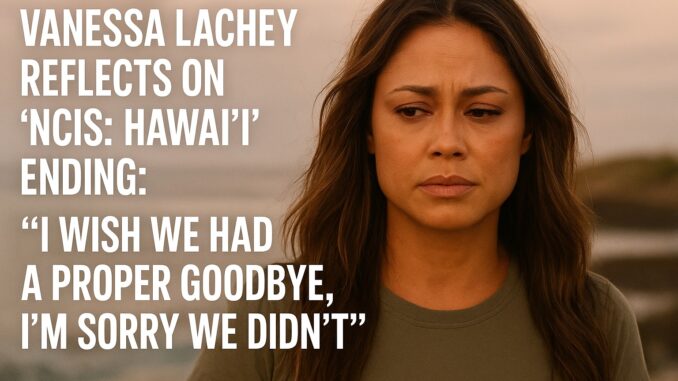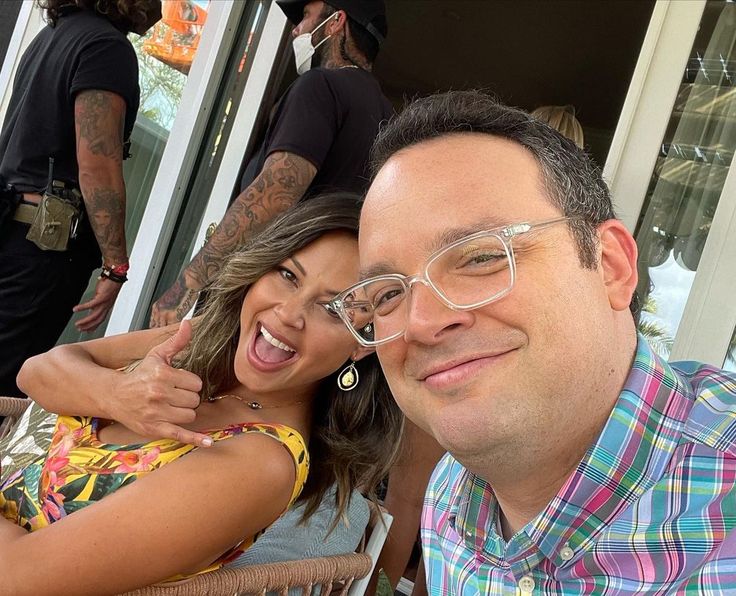
Laying down by the ocean in Hawaii, gazing out at the waves, Vanessa Lachey took a moment to reflect on a journey that had marked her deeply. Her Instagram post—raw, vulnerable, and poetic—cuts straight to the heart of what happens when a TV show designed for longevity ends without the closure it promised. “I wish we had a proper goodbye, I’m sorry we didn’t,” she wrote. Behind those words lies a story of passion, disappointment, gratitude, and unspoken connections.
In this article, we’ll dive deep into Vanessa’s reflections on the ending of NCIS: Hawai’i—how she processed the cancellation, her emotional journey, the impact on cast and fans, and what it speaks to about storytelling, closure, and legacy in TV.
1. The Shock of Cancellation: A Sudden Goodbye
1.1 How the News Broke
In late April 2024, CBS confirmed that NCIS: Hawai’i would be canceled after its third season. The announcement blindsided many—fans, the cast, and Vanessa alike.
1.2 Gutted, Confused, Blindsided
Vanessa described her reaction bluntly: “gutted, confused [and] blindsided.” That very human response captures how personal this project had become to her.
2. Returning to the Beginning: The Spot Where It All Started
2.1 Revisiting Episode One’s Filming Location
She posted a video of herself at the same spot she filmed the show’s first scene—alone, reflective, silent. It was symbolic: to see how far she had traveled, and to reckon with where it all must end.
2.2 A Dialogue with Her Character, Jane Tennant
In the caption, Vanessa framed this as a moment of internal conversation:
“I asked her to protect me, my family, my crew and our show … As I sat here today … knowing our show is over … I turned to her … what do we do now?”
That phrasing shows how blurred lines had become between actress and role, between art and life.
3. “I Wish We Had More Time”: The Regret of Unfinished Stories
3.1 Unfulfilled Narratives and Loose Ends
Vanessa openly lamented that the show didn’t get the chance to tie up its threads: “I wish we had more time, I’m sorry we don’t.” Many viewers felt likewise—that arcs were cut short, relationships unresolved, mysteries unclosed.
3.2 The Desire for a Proper Goodbye
Her most pointed line: “I wish we had a proper good-bye, I’m sorry we didn’t.” It’s a sentiment many share—fans, cast, crew—when a series ends abruptly without a sense of closure.
4. The Deeper Connection: Beyond Just a TV Show
4.1 “We Are All Connected”
Vanessa insisted: “I know we ALL are connected deeper than any TV show.” That idea resonates: when a cast becomes like a family, when fans carry characters in their hearts, the ending isn’t just business—it’s emotional.
4.2 Leaving a Legacy in Hawai’i
She hoped the series would remain a tribute—to Hawai’i’s grace, beauty, culture. She invoked waves, shorelines, borrowed time: images that rest on the idea of impermanence yet lasting impact.
5. Poetry, Waves & “A Hui Hou”: Framing the Final Message
5.1 The Metaphoric Ocean
Her metaphor of air hitting water, waves connecting to shore then receding, was more than pretty writing—it expressed a worldview: impact is transient, yet meaningful.
5.2 Language of Farewell: A Hui Hou
Instead of “good-bye,” Vanessa offered the Hawaiian phrase “A Hui Hou”—“until we meet again.” That choice honors the place central to the show and suggests hopeful continuity.
6. Honor, Representation & Breaking Barriers
6.1 First Female Lead in NCIS Franchise
Vanessa made history in the NCIS universe as its first female lead. Her stepping into that role was a milestone—one she cherished deeply.
6.2 AAPI Representation and Inspiration
In her farewell posts after the finale aired, Vanessa emphasized identity: “As an AAPI Woman … I am more proud than ever to have been your Jane Tennant on TV.” That framing transforms the show’s end into a moment of cultural meaning.
7. Cast & Crew Reactions: Shared Loss
7.1 Cast Voices Their Grief
Tori Anderson, Jason Antoon, Noah Mills—many cast members expressed heartbreak, gratitude, pride.
7.2 A Collective Goodbye Not Given
Media outlets reported that the season 3 finale was not originally intended to serve as a series ender, which deepened the sense of “unfinished business.”
8. Fan Reactions & Cultural Legacy
8.1 Fan Disappointment and Advocacy
Fans immediately voiced frustration and heartbreak. Many argued the show deserved a more intentional ending. The hashtag conversations, fan edits, and online petitions reflected collective grief.
8.2 The Show’s Cultural Footprint
Even with three seasons, NCIS: Hawai’i made a mark: bringing Pacific Islander culture, scenic locations, diverse characters. It inspired viewers and created emotional attachments fast.
9. Coping with the End: Lessons from Vanessa’s Reflection
9.1 Accepting Impermanence
Vanessa framed life and art as on “borrowed time.” That helps reconcile with endings that feel unfair or abrupt.
9.2 Carrying Forward the Good
She encouraged fans to remember the beauty, to spread aloha wherever they go, to honor those who worked on the show by supporting them.
9.3 The Power of Saying “Until We Meet Again”
“A Hui Hou” isn’t a closure so much as a promise—not that this chapter ends forever. That framing helps soften a painful goodbye.
10. Why Some TV Endings Hurt More Than Others
10.1 Emotional Investment Over Time
The longer we live with characters, the more we feel their endings are personal.
10.2 Unresolved Arcs & Loose Threads
When stories feel unfinished, the sense of loss is sharper. Viewers crave closure—and abrupt stops sting.
10.3 Real Lives Behind Fictional Worlds
Actors, writers, crew—all bring real emotions. Their reels extend beyond scripts. When a show ends unexpectedly, their heartbreak echoes with ours.
11. Would a Better Finale Have Helped?
11.1 Possible Alternate Epilogues
Had the network let the writers craft a true series finale—happier or darker, tied arcs or left open—the emotional wound might have closed more cleanly.
11.2 Constraints vs. Creativity
Often cancellations come fast, without opportunity to reconfigure scripts. That’s harsh on creators and fans alike.
12. The Role of Networks in Storytelling Responsibility
12.1 Balancing Business & Art
Networks make decisions based on metrics and budgets, but in doing so they also influence cultural memories and emotional legacies.
12.2 Communication & Transparency Matter
Many viewers criticized CBS for not giving more forewarning, or not acknowledging the emotional stakes. A flatter bridge hurts harder.
13. What Vanessa’s Reflection Teaches Us
-
Closure isn’t always a neat bow—but acknowledgment helps.
-
Art and life entwine; what happens on screen echoes in real hearts.
-
Saying “goodbye” is hard; offering “until we meet again” may help.
-
Legacies survive even when stories end.
-
The emotional labor behind production deserves respect.

14. Looking Forward: What’s Next for Vanessa & Her Cast
14.1 Vanessa’s Next Moves
No official announcement yet, but her voice and platform remain strong. Fans expect more roles that honor representation, impact, and depth.
14.2 Cast Opportunities and Support
Vanessa asked fans to hire and support her cast and crew in new projects. Many are bound to carry lessons and relationships forward.
15. Closing Thoughts: A Goodbye, But Not The End
Vanessa Lachey’s message is not just a lament—it’s a call to remember, to celebrate, and to hold space for beauty even in endings. NCIS: Hawai’i may be over, but its waves continue to ripple—among the cast, the fans, and the cultural memory. She wished for a proper goodbye; even though she didn’t get it, she gave us something real: a raw, soulful farewell that invites us to carry aloha forward. A Hui Hou—until we meet again.
Conclusion
The ending of NCIS: Hawai’i didn’t get the closure it deserved—but Vanessa Lachey’s reflections offer a powerful alternative. Through vulnerability, metaphor, and connection, she transformed heartbreak into a meaningful farewell. Her words remind us that endings don’t always need perfection—they need sincerity.
Even in absence, stories leave traces. And just as waves touch the shore before receding, the impact of this show, its people, and its culture will linger. So, though we say “goodbye,” we also say A Hui Hou—until we meet again.